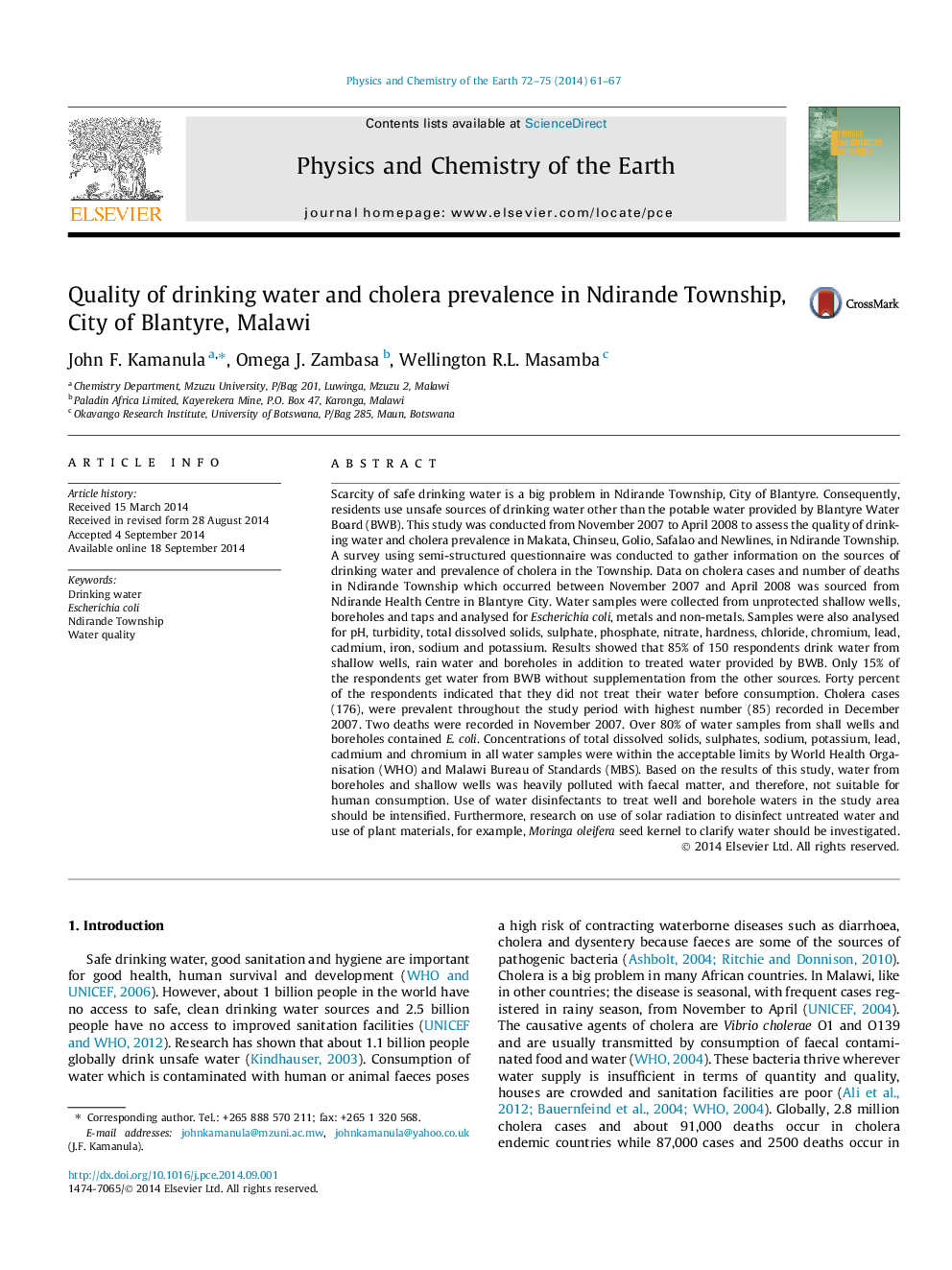| کد مقاله | کد نشریه | سال انتشار | مقاله انگلیسی | نسخه تمام متن |
|---|---|---|---|---|
| 6441965 | 1639354 | 2014 | 7 صفحه PDF | دانلود رایگان |
عنوان انگلیسی مقاله ISI
Quality of drinking water and cholera prevalence in Ndirande Township, City of Blantyre, Malawi
ترجمه فارسی عنوان
کیفیت آب آشامیدنی و شیوع وبا در شهرستان ندیانند، شهر بلانتیر، مالاوی
دانلود مقاله + سفارش ترجمه
دانلود مقاله ISI انگلیسی
رایگان برای ایرانیان
کلمات کلیدی
آب آشامیدنی، اشریشیا کولی، شهر بزرگ، کیفیت آب،
موضوعات مرتبط
مهندسی و علوم پایه
علوم زمین و سیارات
ژئوشیمی و پترولوژی
چکیده انگلیسی
Scarcity of safe drinking water is a big problem in Ndirande Township, City of Blantyre. Consequently, residents use unsafe sources of drinking water other than the potable water provided by Blantyre Water Board (BWB). This study was conducted from November 2007 to April 2008 to assess the quality of drinking water and cholera prevalence in Makata, Chinseu, Golio, Safalao and Newlines, in Ndirande Township. A survey using semi-structured questionnaire was conducted to gather information on the sources of drinking water and prevalence of cholera in the Township. Data on cholera cases and number of deaths in Ndirande Township which occurred between November 2007 and April 2008 was sourced from Ndirande Health Centre in Blantyre City. Water samples were collected from unprotected shallow wells, boreholes and taps and analysed for Escherichia coli, metals and non-metals. Samples were also analysed for pH, turbidity, total dissolved solids, sulphate, phosphate, nitrate, hardness, chloride, chromium, lead, cadmium, iron, sodium and potassium. Results showed that 85% of 150 respondents drink water from shallow wells, rain water and boreholes in addition to treated water provided by BWB. Only 15% of the respondents get water from BWB without supplementation from the other sources. Forty percent of the respondents indicated that they did not treat their water before consumption. Cholera cases (176), were prevalent throughout the study period with highest number (85) recorded in December 2007. Two deaths were recorded in November 2007. Over 80% of water samples from shall wells and boreholes contained E. coli. Concentrations of total dissolved solids, sulphates, sodium, potassium, lead, cadmium and chromium in all water samples were within the acceptable limits by World Health Organisation (WHO) and Malawi Bureau of Standards (MBS). Based on the results of this study, water from boreholes and shallow wells was heavily polluted with faecal matter, and therefore, not suitable for human consumption. Use of water disinfectants to treat well and borehole waters in the study area should be intensified. Furthermore, research on use of solar radiation to disinfect untreated water and use of plant materials, for example, Moringa oleifera seed kernel to clarify water should be investigated.
ناشر
Database: Elsevier - ScienceDirect (ساینس دایرکت)
Journal: Physics and Chemistry of the Earth, Parts A/B/C - Volumes 72â75, 2014, Pages 61-67
Journal: Physics and Chemistry of the Earth, Parts A/B/C - Volumes 72â75, 2014, Pages 61-67
نویسندگان
John F. Kamanula, Omega J. Zambasa, Wellington R.L. Masamba,
